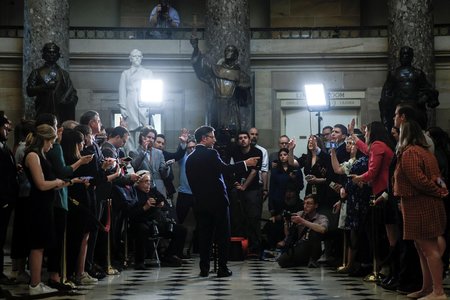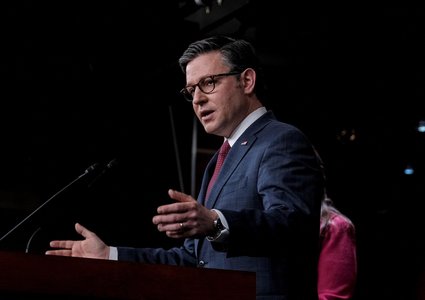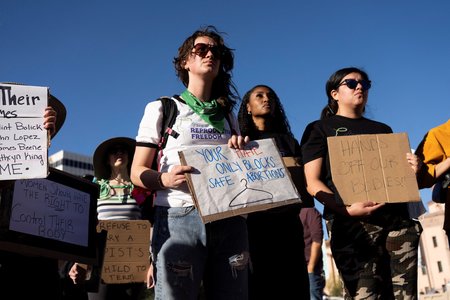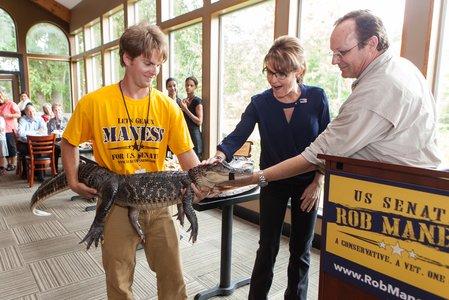We look at recent poll results to gauge pre-election voter trends with John Harwood, and Dan Balz explores the toss-up gubernatorial races around the country. Also, Jeanne Cummings reports on the record-setting $4 billion raised this campaign season and how the money is being spent. Plus, Alexis Simendinger on the newest state and federal Ebola protocols. We also remember the legendary journalist, Ben Bradlee.
Full Episode: Pre-Election Voter Trends, Gubernatorial Elections, Campaign Spending and the Politics of Ebola
Oct. 24, 2014 AT 3:33 p.m. EDT
TRANSCRIPT
Notice: Transcripts are machine and human generated and lightly edited for accuracy. They may contain errors.
GWEN IFILL: Midterm countdown. We look at public opinion, key governors’ races, money politics, and the latest government Ebola response, tonight on “Washington Week.”
(Begin videotaped segment.)
FLORIDA GOVERNOR RICK SCOTT (R): Charlie’s said that he’s taken positions for political expediency, meaning to get elected.
FLORIDA GUBERNATORIAL CANDIDATE CHARLIE CRIST (D): That’s not true.
(End videotaped segment.)
MS. IFILL: The fight for the governor’s mansion, the U.S. Senate, and for the hearts and minds of American voters is in its final stretch.
ILLINOIS GOVERNOR PAT QUINN (D): (From videotape.) Jobs are up, way up. Unemployment is down, way down. That’s the way it ought to be.
WISCONSIN GOVERNOR SCOTT WALKER (R): (From videotape.) This race is going to be close all the way down to the wire.
MS. IFILL: In the most expensive midterms ever, we examine last-minute shifting fortunes from coast to coast. Plus, in the battle against Ebola, the government continues to balance bad news, a new infection in New York City –
NEW YORK MAYOR BILL DE BLASIO (D): (From videotape.) There is no reason for New Yorkers to be alarmed.
MS. IFILL: - against good news, which warranted a presidential hug.
NINA PHAM (nurse who contracted Ebola): (From videotape.) I feel fortunate and blessed to be standing here today.
MS. IFILL: And we remember Washington Post editor Ben Bradlee.
Covering the week: John Harwood, chief Washington correspondent of CNBC; Dan Balz, chief correspondent for The Washington Post; Jeanne Cummings, deputy managing editor for Bloomberg Politics; and Alexis Simendinger, White House correspondent for RealClearPolitics.
ANNOUNCER: Award-winning reporting and analysis, covering history as it happens, live from our nation’s capital, this is “Washington Week” with Gwen Ifill.
MS. IFILL: Good evening.
Pick a state, any state, and you might find a different answer to every question you have about what will happen in the midterm elections, now only 11 days away. Tonight, for our Friday focus, we decided to drill down a bit into the attitudes that are driving this year’s election that’ll either push voters to the polls or keep them at home.
Contributing correspondent John Harwood is here to give us a sense of the perfect storm of crosscurrents that could decide a critical election year, starting with how voters see the economy.
JOHN HARWOOD: You know, Gwen, the economy is the ultimate fundamental. People talk about fundamental conditions. Some people thought for a while it was going to be health care this year; the Democrats were going to make that the linchpin of the election. But that’s really faded, and we’ve gotten back to the economy.
And it’s interesting. If you look at conditions, they’re a little bit better than the sour public mood that we’re living through would seem to suggest. Since Barack Obama started his second term, the unemployment rate in this country is down 25 percent. That is two percentage points off of the 7.9 percent rate when he took office. The Dow Jones average is up more than 20 percent. So you’d think people would be in a good mood. But they’re not.
MS. IFILL: No, they are so not. But what is interesting to me, though, is that voters seem to be also asking for compromise. What do they want from their compromise? They’re saying they want compromise? They’re saying they want confrontation? How does it sort itself out?
MR. HARWOOD: Well, you’ve got a situation where, in 2010, when we had the tea party revolution, you had Republicans and Democrats really faced off with a significant majority saying, no, my side needs to stick to their guns. Now you’ve seen a shift, from the majority wanting people to stick to their positions to a majority saying – 50 percent saying, no, it’s time to compromise and get things done.
We saw that also in our NBC/Wall Street Journal poll as the top issue. Tied with jobs was compromise. But when you drill down on those numbers, what you see is a huge polarization by party. Republicans, a majority of them don’t want to compromise. Independents and Democrats do. And that’s why, paradoxically, voters who want compromise but also are discontented and want change may end up getting the party that doesn’t want to compromise.
MS. IFILL: And I want to follow up on that. Everybody else can jump in. But I want to go through one more thing you found as you’re looking through these polls, which is motivation. Who is motivated to show up at the polls? And how much will that influence what happens?
MR. HARWOOD: Well, that is a very big question surrounding the election. First of all, the greatest enthusiasm is with the Republicans. You see that in the numbers. Substantially more - almost double the share of Republicans say they’re highly interested in the election than Democrats. And among tea party Republicans, it’s way high. More than 70 percent say they’re interested.
The question is going to be, how much does that matter? I talked the other day to Neil Newhouse, who was the pollster for Mitt Romney. He said the number one lesson I took out of that campaign, don’t overestimate the importance of enthusiasm, because if the other side is skilled at turning out voters who aren’t enthusiastic, guess what: Those votes count just as much as the people who are all fired up.
MS. IFILL: So how do candidates maneuver through these crosscurrents? We’re going to talk in a moment about what governors are doing. But let’s talk for a moment about senators who are trying to get elected, reelected, hold on to their seats, survive. How do they – these are all crosscurrents that they could get tripped up in.
MR. HARWOOD: Well, what they’re trying to do is figure out what little data point in the public-opinion environment they can latch onto and ride in the campaign.
Take Mark Udall, the senator in Colorado, for example. You’ve got the unemployment rate there a full point below what the rate is nationally. And yet is he talking about the economy? Not really. He’s talking about women’s issues. He’s talking about abortion and contraception, because they think that’s something that will motivate and drive out the Democratic base. He’s behind right now.
JEANNE CUMMINGS: You mentioned “Obamacare.” And it seems as though it wasn’t really working for the Republicans, and yet they are closing by bringing the issue back. Where is the public on that issue? And could it work?
MR. HARWOOD: It’ll work to motivate some of the base voters. And there are certain aspects of it that resonate that you hear a lot in the states that I’ve been to this fall are, oh, what about that promise if you like your doctor, if you like your insurance plan, you can keep it? Everybody remembers that. That’s very easy to put your arms around. But when we asked in our NBC/Wall Street Journal poll top issues, health care was fifth. Eight percent say it was their top voting issue.
DAN BALZ: And yet the advertising down the stretch on the Republican side is still very much using “Obamacare.” How do you explain that sort of contradiction?
MR. HARWOOD: Well, we’ve got a base election, and so each side is trying to fire up their people. Obama himself is such a polarizing force and so unpopular and something that the Republicans can use to try to drive their base and also drive disaffected independents. So “Obamacare” contains the word Obama, and it’s useful for that reason. (Laughter.)
MS. IFILL: Thanks for clearing that up, first of all, and for –
MR. BALZ: I think he got to the core point.
MS. IFILL: So while we in Washington are obsessing about what the midterm elections will do to the balance of power in the U.S. Senate, something equally as dramatic has been playing out in gubernatorial races around the country. And the outcome of contests from Tallahassee to Topeka may have even more to do with your life. Dan’s been out on the road and is here to explain why.
How many competitive races are we talking about, Dan?
MR. BALZ: Well, there are 36 states with gubernatorial races. And you could say about half, actually, are somewhat competitive. And Charlie Cook’s Cook Political Report at this point puts 11 of those races as pure tossups. And another are the Republican-held seat in jeopardy and leaning Democratic.
The most interesting thing, though, Gwen, is the number of incumbent Republican and Democratic governors who are in trouble. Normally what we see is it’s open seats where you have the greatest competition. But there are probably seven or eight Republican incumbents who are in really tough races and three Democrats who are in really tough races.
MS. IFILL: You were in Colorado with John Hickenlooper, one of the (tough ?) Democrats.
MR. BALZ: I was. I was there early in the week. Governor Hickenlooper won fairly easily four years ago. He had weak opposition, so he didn’t have a huge number, but he won without any great trouble. He came in with a kind of a quirky personality that had worked for him very well in Denver when he was the mayor. He was kind of a pro-business centrist, not particularly partisan.
Today he is in trouble in part because that style of leadership is now seen as ineffective or weak or wishy-washy. He’s made –
MS. IFILL: Going against Bob Beauprez, the Republican.
MR. BALZ: Bob Beauprez ran for governor in 2006 and lost badly. He’s a former member of the House. He’s come back. This time he’s running a much better race. And Hickenlooper and he are in almost a dead heat at this point. I think that the Democrats in Colorado that I talked to believe that Hickenlooper will be able to pull it out, but the Republicans still think they have a shot there.
MS. CUMMINGS: Dan, one thing that’s interesting is that, as John pointed out in the case of the president, many of these governors have seen their economies improve and yet they’re still in a lot of trouble. So what’s driving – what’s driving the different races?
MR. BALZ: Jeanne, it’s different in almost every state. The economy is an aspect of it. But take a state like Wisconsin. The economy is an issue there. Governor Walker, who won in 2010, is running against a businesswoman, Democrat Mary Burke. They have clashed a lot about whether he had fulfilled promises on the economy that he made when he ran. But the real issue is Scott Walker and what he did when he first came into office when he blew up the state over collective bargaining rights for public employees. You know, he survived the recall in 2012. But Republicans nationally are quite worried about whether he’ll survive. And there’s real stakes for him in that race, because he wants to run for president in 2016. He’s got to get through the next 11 days before he can do that.
MS. IFILL: A leading Democrat in Wisconsin told me recently that no one – that a lot of Democrats didn’t know who she was. They just knew she was not Scott Walker.
MR. BALZ: Yes.
ALEXIS SIMENDINGER: Dan, really quickly, I wanted to ask you about Governor Hickenlooper. You pointed out in something that you wrote that he prides himself on not responding in kind to attack ads. And yet he’s being attacked for being sort of weak and maybe wishy-washy.
How is that really going to work out for him? Because he predicted that this will accrue to his benefit.
MR. BALZ: I have talked to him a couple of times about this. Most recently when I was out there, I got him on the phone. And he said – I said, do you have any regret about this? He said I do not. He said negative ads are going to kill democracy. Now, we should stipulate that he hasn’t stopped any of his allies from running negative ads – (laughter) – against Beauprez. But nonetheless, he hasn’t run any.
I said do you have any regret about that? He said no. He said I think that that may be one of the reasons I will win, because there’s so much negativity out there. This allows me to stand apart.
MR. HARWOOD: Dan, Pat Roberts, the senator in Kansas, is coming back in that race. Is Sam Brownback coming back, the governor?
MR. BALZ: Perhaps not enough. I was there for a day and a half. And if you look at that race, this is a conservative governor in a conservative state who may end up proving the limits of how much -
MR. HARWOOD: (Inaudible.)
MR. BALZ: - you can go. I think he’s in genuine trouble. I talked to some national Republicans who say that the problem – on the one hand, his path is simple. He just needs to get Republican votes because it’s an overwhelmingly Republican state. But at this point he’s not doing that. And they’re not sure, given everything that has happened up till now, that he’s going to be able to get enough Republican votes to survive.
MS. IFILL: (Inaudible.)
MS. CUMMINGS: What about Florida?
MS. IFILL: Go ahead. Go ahead. Sneak it in.
MS. CUMMINGS: Yeah, I love Florida, where they’re bound to elect someone that the majority of the people don’t like. They both have higher unfavorables than favorables.
MR. BALZ: As they say, it’s the risk we take in democracy. (Laughter.) You have the governor, Rick Scott, who is a Republican, anything but a politician, not a natural politician. You have Charlie Crist, the former Republican governor turned Democrat, who is, if anything, a pure political animal. And both of them have managed to turn off the state. They’ve spent, you know – you would know better than I exactly how much they’re going to spend, but it’s –
MS. IFILL: A gazillion.
MR. BALZ: I was going to say, yeah, a gazillion.
MS. IFILL: A technical term, yeah.
MR. BALZ: And nobody particularly likes them. They have had a series of debates; one weird debate where the governor wouldn’t come out. They had another nasty debate last week. This is going to go down to the wire. And, you know, you can flip the coin at this point.
MR. HARWOOD: Sorry, I kicked your fan. (Laughter.) I didn’t mean to do that.
MS. IFILL: There’s a fan under the table.
MR. BALZ: I’m leaving the stage. (Laughter.)
MS. IFILL: Another way to keep track of where the campaign has been and where it’s going is to – and I hate to say it – follow the money. The Center for Responsive Politics reports today that $4 billion is being spent on these congressional elections, the most ever, including in the 2012 presidential year.
It’s a sign that although voters may just be waking up to all this, invested activists on all sides have been spending freely for quite a while. So where is the money coming from, and where is it going, Jeanne?
MS. CUMMINGS: Well, much of the phenomenon this year is twofold. It’s – basically we are $400 million higher than in 2010. So that’s $3.6 billion in the last one, $4 billion this year.
Two things hard at work here: The primaries. The Republican primaries were very, very expensive. Over $100 million was spent out there by candidates, committees, super PACs, to just settle the intraparty fight, the civil war among the Republicans.
A prime example of that is Mitch McConnell in Florida.
MS. IFILL: In Kentucky.
MS. CUMMINGS: I’m sorry; in Kentucky. He spent $21 million getting himself elected six years ago. He’s going to spend over $40 (million) getting himself reelected or defeated this cycle. And much of that is because he had to finance, or his allies did, two campaigns, two full-blooded campaigns.
MS. IFILL: And isn’t there a lot of money we don’t even know about?
MS. CUMMINGS: Oh, there’s –
MS. IFILL: That’s just the money we’re talking about. There’s dark money too.
MS. CUMMINGS: There is dark money. Now, the dark money is not as big in this midterm as it was in the presidential. There’s still plenty of it out there.
MS. IFILL: Explain what it is for people.
MS. CUMMINGS: OK, sure. We see groups like Karl Rove’s American Crossroads has a super PAC that reveals to the FEC how much money and where they get it from and all of their spending. And then they have another arm that is an educational arm, voter educational arm, and that is classified sort of as a charity, and they don’t have to release their donors. We don’t know how much money is in there. We do learn how much they spend. We don’t know how much they raise or from whom.
So there is some dark money out there. But what we’ve also seen this cycle is, you know, once again more of the billionaires stepping into the political environment and playing. You know, and many of them are playing on issues. But a few weeks ago we saw alarms being set, turned on, by many Republicans because the super PACs that Republicans had always dominated with were actually being outspent. And in part that’s because, when you look at the biggest billionaires in the game, the top three are Democrats, led by Tom Steyer, who has pledged to spend $50 million of his own money. And he’s well on the way. He’s already spent $42 (million).
MS. SIMENDINGER: Jeanne, one of the things that we always are trying to figure out is which party is doing better in the fundraising and how do they spend it. Are they at parity? How would we –
MS. CUMMINGS: They’re way over – I mean, they’re way over parity. I mean, there’s enough money. Everybody – (laughter) – everybody’s got enough money. I mean, there’s so much money –
MS. IFILL: It’s just where they’re going to spend it.
MS. CUMMINGS: Yeah. And they are starting to (do this ?).
MS. IFILL: And is it all ads? Is it all television?
MS. CUMMINGS: No, they’re spending a lot of money on perfecting the way of communicating with people. So some of it – some of them are starting to move into social media a lot deeper, so it’s not just TV ads. Frankly, the TV stations are running out of space. There is a station in Iowa that added a 4:00 p.m. newscast just so they could suck up more money.
MR. HARWOOD: Jeanne, bottom-line question: Do you – when we wake up the day after the election, if we have a result, say, in the Senate, do you think that that result will have been determined by money? Or do we know that both sides have more than enough to get their messages out and it really is not the critical factor?
MS. CUMMINGS: I think it will be about money, but not message. It’s where they invest it. And one of the big things we’re watching election night is the Democratic Senatorial Committee put an unprecedented amount of money into the ground game. And that is the way they either win or lose. And that investment – if you think about money, it’s not TV ads. It’s going to be whether that was a wise investment.
MS. IFILL: Whether they were able to energize their base sufficiently.
MS. CUMMINGS: And bring them out.
MS. IFILL: Well, Americans still have questions about the spread of the Ebola virus. But one thing seems certain. Those most at risk are residents of three West African countries and the people who come into close contact with those most sick, usually health care workers.
Two more infected health care workers and a freelance cameraman in the U.S. have been declared Ebola-free, while another has been found to have the disease in New York.
The president has appointed an Ebola coordinator. And today Mr. Obama went out of his way to meet with nurse Nina Pham, who has just been released from the National Institutes of Health. But even reporters still had questions; among them, was that safe?
Alexis, what is all the skepticism about?
MS. SIMENDINGER: Well, there was a little bit of overwrought questioning about whether the president would feel free to bowl in New York -
MS. IFILL: That was at today’s White House briefing.
MS. SIMENDINGER: - right – or whether he was really safe in giving a big bear hug to this very petite nurse from Dallas, Nina Pham. And what we saw was a lot of optics. And the president’s desire was to be very reassuring, to show that this is a very hard disease or virus to contract. And in this particular case, Nina Pham is Ebola-free and, in fact, is going home to Dallas.
So we saw that in New York as well. There’s a new case, Dr. Craig Spencer, as we know, who is now at Bellevue Hospital. The mayor of New York, Bill de Blasio, was seen riding on the subway, because this particular doctor who has now come back from West Africa from Guinea and has the virus –
MS. IFILL: So does this mean that government has decided that just saying you can’t catch it, you can’t catch it, you are at low risk, is not working? So they’re demonstrating, through, you know, putting out Dr. Fauci wearing a lab coat and –
MS. SIMENDINGER: Absolutely.
MS. IFILL: - appointing an Ebola coordinator, that it’s safe?
MS. SIMENDINGER: I think your point is really a good one. And I would have said yes. But now there’s another wrinkle, and that is, by tonight the governor of New York and the governor of New Jersey, a Democrat and Republican, sat down together and initiated their own state-based quarantine protocol for health care workers coming back from these three Ebola-afflicted countries through New York and New Jersey.
This was hours after they were trying to reassure and tamp down the concern about Ebola spreading in their states or in New York City. And they decided to ignore the CDC protocol and say we can do our own thing and we can quarantine these health care workers for 21 days.
Now, the government, the federal government, President Obama and his new coordinator, Ron Klain, are juggling yet another jurisdictional wrinkle as of tonight, and that is whether the federal government will follow the lead of these two states.
MR. BALZ: Do the people at the White House, at the end of this week, feel as though they have gotten this not totally under control, but feel better about where things are than they did a week ago?
MS. SIMENDINGER: They absolutely, from the president all through the staff, really sighed some relief this week that it had ended up, they thought, better than at the beginning, although the good news about two nurses being cured or obviously being released is somewhat mitigated by the doctor coming back who has it in New York City.
But the president has tried to argue very assertively that every day, in every way, the federal government is trying to organize and manage better. We saw a hearing on Capitol Hill on the House side, under Chairman Issa from California – he’s been often a critic of President Obama – saying that this is still a bumbling response, and they’ve tried to shift their criticism in new ways.
MR. HARWOOD: Alexis, we’re obviously talking about elections for a lot of this show.
MS. SIMENDINGER: Yeah.
MR. HARWOOD: So let me ask you a political question. At the White House, do they believe – and what is your own sense as a reporter – about whether or not this issue is going to have any impact whatsoever on the midterm elections?
MS. SIMENDINGER: Well, it’s come up in some of the campaigns as a topic in terms of trusting government or management. But it has not come up as a concerted fear about, you know, people going to the polls, for instance, or voting, actively voting and that kind of thing.
And I don’t think the White House has evident concern in that way. What they’re really concerned about is that there is something else ahead.
MR. HARWOOD: But what I mean is, does it cut to one party’s benefit in a substantial way or not?
MS. SIMENDINGER: Well, it has hurt the Democrats in the sense that the concern has been that the government has been reluctant to do, like, a travel ban. You saw Democrats start to pile on that they were interested in seeing more of a ban. So you can see nervousness there.
MS. IFILL: OK. We’ll keep watching for the nervousness, and some of the exploited nervousness as well –
MS. SIMENDINGER: Right.
MS. IFILL: - when you talk about politics. Thank you.
Before we go tonight, I know there are at least three of us at this table who have one larger-than-life man to thank, at least in part, for our careers. Benjamin Crowninshield Bradlee died this week. He was the editor of The Washington Post and the man most famous for shepherding the Watergate coverage that drove Richard Nixon from office.
But over decades in Washington, he was journalism – tough, uncompromising, with a keen eye for truth and a nose for anything that didn’t, how shall we say, smell right.
John, you not only knew Ben Bradlee, but your dad was an editor at the Post who was one of his deputies. And we worked with him.
MR. HARWOOD: Exactly. You know, I’ve known Ben Bradlee since I was a little kid because my dad worked for him for a long time. I remember taking a trip with my dad, Ben, his son Dino, to the Redskins training camp; you know, a little kid thing.
The one professional setting that I had a memorable experience was the night that Richard Nixon gave the speech announcing that he would resign as president. I was a copy boy that summer at the Washington Star. As I was getting off work, my dad called and said I think you’re going to remember it for a long time if you come to the Post tonight. He had a sense that maybe I was going into this business. And I went to the Post, and we watched Nixon give that speech in Bradlee’s office, with all of the editors and reporters who were working on that story. And I have to say, I got some questions on Twitter this week about that reminiscence, and was there high-fiving and cheering. There wasn’t. There was a reverence for the moment. And that was the tone set by Bradlee.
MS. IFILL: Dan, you worked for him for a long time.
MR. BALZ: I did. He hired you. He hired me. I remember the interview I had with him, as I’m sure you do, which was all a little bit scary, but ultimately pretty easy. I mean, he was the last box that had to be checked, and he could not have been more gracious and friendly.
I remember him the morning that Gary Hart dropped out of the race in 1987. And I and Ann Devroy, the late great Ann Devroy, were in his office as this was all unfolding, and he was in a conversation with one of Hart’s advisers back in Colorado because we had additional information. He was a great and inspiring person to work for.
MS. IFILL: He was. I do remember getting hired by him. And I can – I tell the story online. We don’t have time to talk about it now. But I have to say that he was an intimidating figure – (laughter) – but a lovable one.
Thank you, everybody.
Our condolences go out to his wife Sally and his son Quinn.
We have to go now, but there’s even more to say on the “Washington Week” Webcast Extra, where, among other things, we’ll take you behind the scenes on the campaign trail. That streams live at 8:30 p.m. eastern and all week long at PBS.org/WashingtonWeek.
Keep up with daily developments with me and Judy Woodruff at the PBS NewsHour. And we’ll see you here next week on “Washington Week.” Good night.
MOST POPULAR


Full Episode: Washington Week with The Atlantic full episode, 4/19/24


Clip: Will Democrats rescue Johnson's speakership to protect aid for Ukraine and Israel?


Clip: Attacks in Israel and Iran bring more uncertainty to Middle East

Preview: Coming Up on Washington Week with The Atlantic


Full Episode: Washington Week with The Atlantic full episode, 4/12/24

© 1996 - 2024 WETA. All Rights Reserved.
PBS is a 501(c)(3) not-for-profit organization


